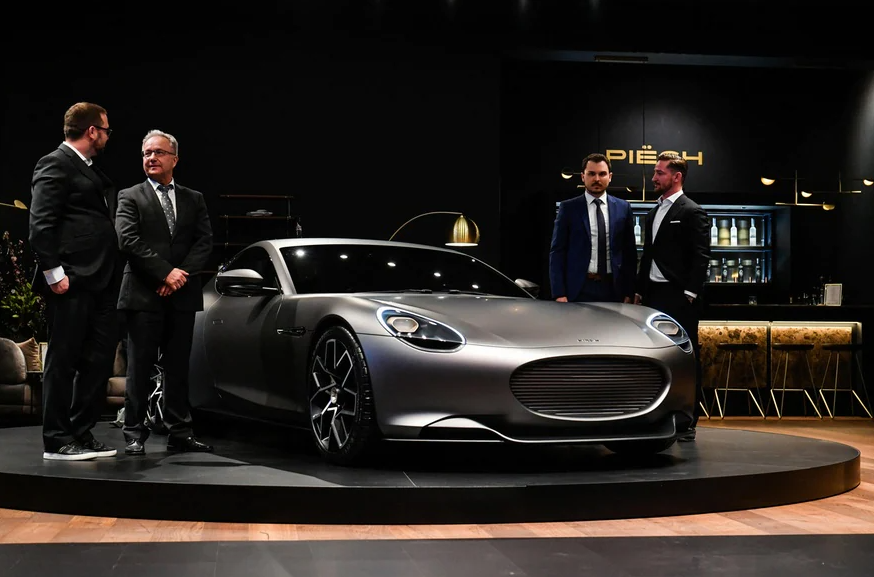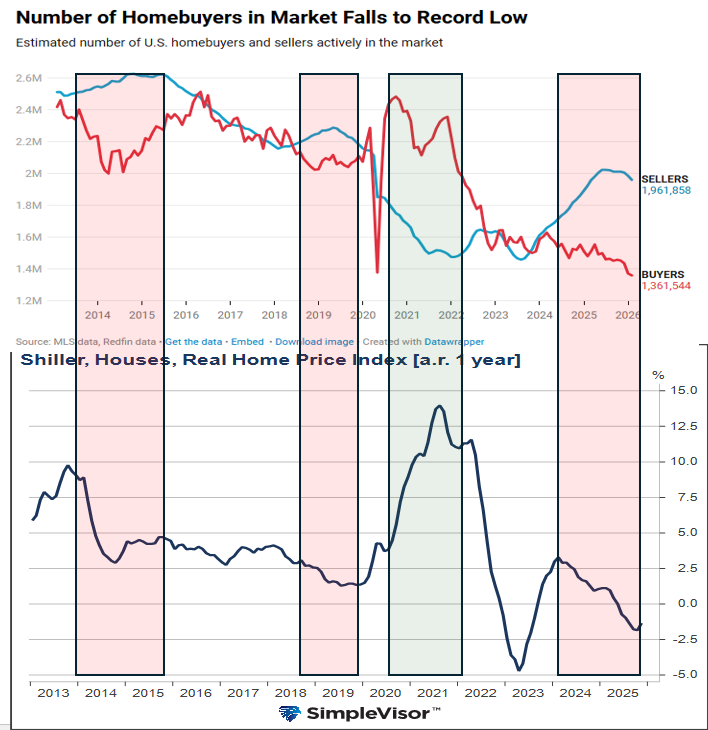Anton “Toni” Piëch, co-founder of the Swiss electric car manufacturer Piëch Automotive, tells SWI swissinfo.ch why he chose Zurich and how he intends to make his mark in a highly competitive market with battery-powered cars for “purists who love technology”.
Piëch, who says he wants to breathe new life into the Swiss car industry, is a scion of an Austrian-German family with a rich automobile history: his great-grandfather was Ferdinand Porsche and his father, Ferdinand Piëch, was CEO of Volkswagen.
swissinfo.ch: Why did you choose Zurich as a base for Piëch Automotive?

Co-founders of Piëch Automotive, Toni Piëch (left) and Rea Stark Rajcic (right), pose in front of their new two-seater electric vehicle at the Geneva Motor Show on March 5, 2019. Harold Cunningham / AFP
Toni Piëch: As a European, I think it’s important that Europe keep playing a significant role in the world. In the automobile industry, Europe has a very solid industrial base.
Although I am part-Austrian and part-German, I grew up in Lucerne and I appreciate the values of long-term reliability that you find in Swiss watches, for example. These are the values Piëch Automotive wants to exemplify.
Finally, Zurich is a major financial centre and increasingly a technology hub, with companies like Google.
swissinfo.ch: Switzerland also has many automotive suppliers…
T.P.: Sure, but that wasn’t a decisive factor, because we could have had good access to the Swiss suppliers from another country such as Germany, Austria or Italy. In any case, we’re working with suppliers not only here in Europe but also outside it.
swissinfo.ch: With all these foreign suppliers, can you really claim that your cars are ‘Made in Switzerland’?
T.P.: No, because according to “Swissness” rules, at least 60% of the value needs to be produced in Switzerland. In the automobile industry, that’s not realistic.
Toni Piëch
Anton Piëch was born in 1974 and comes from an Austrian and German family. He went to school at the Lyceum Alpinum in Zuoz, near St Moritz in eastern Switzerland. He then studied Far Eastern studies at Princeton in the US.
He spent 12 years in China, first as a correspondent for Swiss radio, then as founder and president of PAE Pictures, a company specialising in the production of feature films, television programmes and digital content.
End of insertion
swissinfo.ch: Some makers of electric cars, like Porsche, are offering a range of models and options; others, such as Tesla, are not. Where does Piëch Automotive fit in?
T.P.: Our strategy is different again. Our goal is to create objects of passion: classic cars meant for purists who love technology.
swissinfo.ch: Around the world there are at least 100 start-ups specialising in electric vehicles. Established car makers are also increasingly turning their attention to these vehicles. How do you expect to stand out?
T.P.: Our sector is indeed highly competitive, but we’re not worried, because our approach is not to sell the largest number of cars as quickly as possible. Our vision is to serve a very specialised niche and to keep turning a respectable profit over the long term.
swissinfo.ch: You highlight the very short recharging time for your batteries. Since you buy these batteries, how can you stop your rivals buying them too?
T.P.: Our main trump is our modular construction. This approach lets us add new external components very quickly, such as charging systems, sensors, chips, data management systems and so on. In comparison, established car makers such as Volkswagen Group need several years to bring these new components on stream.
In other words, we’re not trying to get exclusive access to particular suppliers; we just want to be the first car maker to integrate their revolutionary components.
swissinfo.ch: In 2019, at the Geneva International Motor Show, you announced that sales of your first model would start in 2022. Can you confirm this date? And what will be the sale price?
T.P.: At this stage we would prefer not to specify a date for our first model. It will be a two-seater with a price range of CHF150,000 ($166,000) to CHF200,000.
swissinfo.ch: What parts of the world do you intend to focus on?
T.P.: Basically, we want to have equal coverage of North America, Europe and Asia. However, at the outset, we think it’s very important to be successful here in Switzerland and in Germany. That’s really a prerequisite for succeeding in other markets.
Getting regulatory approval for a car in many different countries is going to be a challenge, for sure, but we believe we can handle it.
swissinfo.ch: As well as the two-seater, what other models do you expect to bring to market?
T.P.: Our goal is to launch three sports models: the two-seater, a four-seater and an SUV. The last two should let us shift greater volumes. We have high hopes for our SUV in China. Given our modular approach, putting out a three-model range should not be too difficult.
swissinfo.ch: Are you going to sell direct or through dealers?
T.P.: We want to keep the structure as light as possible, except when it comes to contact with the customer. So we intend to focus on direct sales.
swissinfo.ch: You have raised about $100 million (CHF90 million), a key investor being Peter Thiel, the founder of PayPal and Palantir. What are the next steps?
T.P.: For our next investment round we’re aiming for $200 million to $300 million. We can see various possibilities for that, such as a private placement [a non-public offering], listing on the stock market in the traditional way, or a SPAC [special purpose acquisition company].
To persuade potential investors, we have to display solidity. For this reason we have hired experienced managers. I’m thinking for example of Matthias Müller, a former CEO of Porsche and Volkswagen who has been chairman of our board since the end of 2020.
swissinfo.ch: How does one get a former CEO of Porsche and Volkswagen interested in a start-up?
T.P.: The top-level executives we have hired were attracted by our vision and the agility of our organisation. Zurich is also a good place to attract executive talent and seasoned managers from the auto industry, even though Munich or Stuttgart might be just as attractive.
swissinfo.ch: You worked in China for 12 years. What struck you most about the country?
T.P.: The great ambitions the Chinese have – and how fast they can act. In Switzerland the pace is slower, but the basis is more solid.
(Translated from French by Terence MacNamee)
Full story here Are you the author? Previous post See more for Next postTags: Business,Featured,newsletter





















